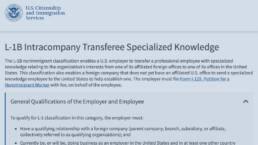The L-1 (“intracompany transferee”) classification is utilized by employers to transfer executives, managers, and specialized knowledge employees to the United States from an affiliated office abroad. Executives and managers can qualify for work authorization under the L-1A classification, and specialized knowledge employees can qualify under the L-1B classification.
This article will focus on the L-1B category and what it means to possess “specialized knowledge”.
How to Qualify for L-1B Status
To qualify for L-1B status as a specialized knowledge employee, it must be shown that:
- The employee possesses “specialized knowledge”;
- That the position offered involves the “specialized knowledge” held by the employee; and
- That the employee has at least one continuous year of employment abroad in a managerial, executive, or specialized knowledge position with the petitioning employer or any qualifying organization within the preceding three years.
A qualifying organization includes a parent company or a subsidiary, affiliate, or branch of the petitioning employer.
Defining Specialized Knowledge
The definition of “specialized knowledge” is multilayered and complex. The regulations define the term as “special knowledge” of the employer’s products, services, research, equipment, techniques, management, or other interestsor “advanced knowledge” of the organization’s processes and procedures. In addition, several policy memos have been released since the creation of the L-1 category clarifying what it means to possess special or advanced knowledge.
The term “special knowledge” is defined as: Knowledge of the petitioning organization’s product, service, research, equipment, techniques, management, or other interests and its application in international markets that is distinct or uncommon in comparison to that generally found in the particular industry.
The term “advanced knowledge” is defined as: Knowledge of or expertise in the petitioning organization’s specific processes and procedures that is not commonly found in the relevant industry and is greatly developed or further along in progress, complexity and understanding than that generally found within the employer.
So, how do you prove that an employee possesses “special knowledge” that is “distinct or uncommon” or that he or she has “advanced knowledge” that is “not commonly found in the industry” and “is further along in progress, complexity and understanding than that generally found within the employer”? Well, the answer depends on the nature of the business and the knowledge possessed by the employee.
Government Review of L-1B Applications
When reviewing an L-1B application, the government officer will refer to a non-exhaustive list of six factors to determine if an employee possesses specialized knowledge. These factors include:
- Does the employee possess knowledge of foreign operating conditions that is of significant value to the petitioning organization’s U.S. operations?
- Has the employee been working abroad in a capacity involving assignments that have significantly enhanced the employer’s productivity, competitiveness, image, or financial position?
- Can the employee’s claimed specialized knowledge normally be gained only through prior experience with the petitioning organization?
- Does the employee possess knowledge of a product or process that cannot easily be transferred or taught to another individual without significant economic cost or inconvenience?
- Does the employee have knowledge of a process or a product that is either sophisticated or complex, or of a highly technical nature, although not necessarily unique to the petitioning organization?
- Does the employee possess knowledge that is particularly beneficial to the petitioning organization’s competitiveness in the marketplace?
If the answer to these questions is yes, you may have a strong case for L-1B status. The next step is assembling the necessary supporting evidence.
Proving That an Employee Possesses Specialized Knowledge
When preparing an L-1B application for a specialized knowledge employee, it is important to explain in detail the specific nature of the industry or field involved, the nature of the petitioning organization’s products or services, the nature of the specialized knowledge required to perform the employee’s duties, and the need for the employee’s specialized knowledge. It is also necessary to compare the employee’s knowledge to that of others and indicate how difficult it would be to impart such knowledge to others without significant cost or disruption to the petitioning organization.
Evidence that an employer may submit to demonstrate an individual’s specialized knowledge includes, but is not limited to:
- Documentation of training, work experience, or education;
- Evidence of the impact, if any, the transfer of the individual would have on the petitioning organization’s U.S. operations;
- Contracts, statements of work, or other documentation that illustrates how beneficial the employee’s knowledge is to the petitioning organization’s competitiveness in the marketplace;
- Evidence that the employee has worked on assignments that have significantly enhanced the petitioning organization’s productivity, competitiveness, image, or financial position;
- Training records proving that the employee’s specialized knowledge can only be gained through prior experience or training with the petitioning organization;
- Curricula and training manuals for internal training courses, financial documents, or other evidence demonstrating that the employee possesses knowledge of a product or process that cannot be transferred or taught to another individual without significant economic cost or inconvenience;
- Evidence of patents, trademarks, licenses, or contracts awarded to the petitioning organization based on the employee’s work, or similar evidence that the employee has knowledge of a process or a product that either is sophisticated or complex, or of a highly technical nature; and
- Payroll documents, federal or state wage statements, documentation of other forms of compensation, resumes, organizational charts, or similar evidence documenting the positions held and the compensation provided to the employee and parallel employees in the petitioning organization.
A petitioning employer may submit any other evidence it chooses. In all cases, the government will review the entire record to determine whether it has been established by a preponderance of the evidence that the employee has specialized knowledge. Merely stating that an employee’s knowledge is somehow different from others or greatly developed does not, in and of itself, establish that he or she possesses specialized knowledge.
How to Submit an L-1 Application
For citizens of Canada, an L-1 petition can be filed with U.S. Customs and Border Protection (CBP) at a port-of-entry. A decision is normally issued on the spot, and, upon approval, the transferee can immediately begin working in the United States.
For all other nationalities, an L-1 application is a two-step process. First, a petition is filed through the mail with U.S. Citizenship and Immigration Services (USCIS). Once approved, the transferee must then schedule and attend an L-1 visa interview at a U.S. Embassy or Consulate abroad before traveling to the United States.
Conclusion
The L-1B category is utilized by multinational companies all over world to transfer key specialized knowledge employees to the United States. However, the requirements for this nonimmigrant classification are complex and confusing, and the U.S. government is not shy about denying immigration petitions. As a result, it is important that L-1 applications are prepared carefully, and each submission must include appropriate supporting documentation that establishes an individual’s eligibility as a specialized knowledge employee.
If you are interested in applying for L-1 status on behalf of yourself or for one of your employees, please feel free to reach out via LinkedIn or send me an email at zahlstrom@usimmlawyer.com.
Published 6 November 2020
Ready to have Berardi on your side?
Whether you’re a business looking to hire or a professional hoping to relocate, immigration law can be complicated. But you don’t have to do it alone. Put our experience to work for you.



